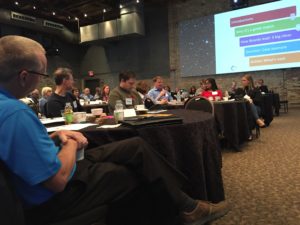|
Getting your Trinity Audio player ready...
|
Neil Sarginson has always had an interest in the arts.
Several months ago Sarginson, a senior business consultant at Manulife in Kitchener, decided to act on that interest and joined the board of the Canadian Clay and Glass Gallery in Waterloo after taking part in Capacity Canada’s Matchboard training program. The program, utilized by Manulife staff in Waterloo Region and Toronto since 2011, ‘matches’ employees from major corporations to volunteer positions on boards of charitable non-profit organizations.
Sarginson, whose only previous experience was serving on a condo board, says the last two months he’s worked on the gallery board has been quite the learning experience, especially when it comes defining his role as a board member.
“I just went through a weekend strategy session with them and it was phenomenal,” he said. “But I want to learn more about what a good board member does and some of the attributes you should have as a board member.”
His quest for knowledge is exactly what Capacity Canada’s Steve Farlow, who facilitated a board governance workshop Nov. 3 with Capacity Canada’s Ruth Cruickshank, likes to see when it comes to empowering volunteers who want to serve the charitable not-for-profit sector more efficiently. Sarginson was among approximately 100 board members, professionals and non-profit workers that took part in the event sponsored by Manulife at The Tannery Event Centre in Kitchener.
Farlow, founding executive director of The Schlegel Centre for Entrepreneurship at Wilfrid Laurier University, has facilitated many of Capacity Canada’s 16 or so board governance ‘BootCamps’ and says it’s vital that those signing on to serve on a board should realize their efforts are valuable.
“Their work matters,” he said in an interview after the workshop. “They must realize how important the not-for-profit sector is overall to Canadian society.”
Figures presented to the workshop participants indicated the not-for-profit sector has a $50 billion economic impact, roughly 2.6% of Ontario’s GDP, and that there are 55,000 not-for-profits and charities in the province (just over 2,000 alone in Waterloo Region). As well, the sector employees about one million people, about 600,000 of them full time.
“They have to know they can make a huge difference here,” said Farlow.
On a personal note, Farlow and Cruickshank told the participants how volunteering on their first boards resulted in personal, not just career development, by helping them forge life-long friendships.
But Farlow admits there are challenges as boards try to define their roles and attempt to steer clear of taking on a leadership role in the organizations they serve.
He said some board members may find themselves acting in a fundraising capacity, something they did not expect when they signed on.
Sarginson can relate and says this something he now sees on the board he serves.
“The way funding is addressed in the arts world is continually evolving. Sources are drying up and new sources have to be found,” he says. “I think we’re struggling with a way to do that.”
To provide participants at the workshop with a clearer definition of how boards can operate more efficiently, Farlow and Cruickshank (a recently retired business policy and strategy professor at Wilfrid Laurier’s Lazaridis School of Business and Economics) outlined how board members can lead with three roles: oversight; foresight; and insight.
These were concepts Jane Macdonald, an instructor at Conestoga College and a new board member for SHORE Centre in Kitchener, said she appreciated.
She also noted the importance for good board members to ask questions.
“That was a really good take away for me since I ask a lot of questions,” said Macdonald after participating in the workshop, noting it was important for board members to keep the mission of their organization in mind when making decisions.
“Most boards tend to focus unproportionally more on the oversight role,” said Farlow, explaining the other two roles are just as important. “Better boards build better organizations.”
Farlow said training for leaders is also vital and that many non-profits tend to overlook its importance.
“So many not-for-profits don’t set money aside for professional development,” he said, adding this is something not found in the corporate world. “I can’t think of any progressive company that doesn’t do that.”

